| Listing 1 - 10 of 27 | << page >> |
Sort by
|
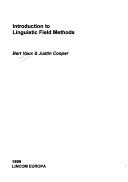
ISBN: 3895861987 Year: 1999 Volume: 01 Publisher: München LINCOM Europa
Abstract | Keywords | Export | Availability | Bookmark
 Loading...
Loading...Choose an application
- Reference Manager
- EndNote
- RefWorks (Direct export to RefWorks)
Linguistics --- Linguistic analysis (Linguistics). --- Linguistique --- Analyse linguistique (Linguistique)
Book
ISBN: 1283164930 9786613164933 3110222515 9783110222517 9783110222500 3110222507 9781283164931 6613164933 Year: 2011 Publisher: Berlin ; New York : De Gruyter Mouton,
Abstract | Keywords | Export | Availability | Bookmark
 Loading...
Loading...Choose an application
- Reference Manager
- EndNote
- RefWorks (Direct export to RefWorks)
This book reconsiders the classic topics of linguistic analysis and reflects on universal aspects of language from a typological and comparative perspective. The aim is to show the crucial interactions which occur at the different levels of grammar (phonology, morphology, lexicon, syntax and pragmatics), illustrating their various roles in the structural organization of the sentence and exploring how interface relations contribute to yield interpretation in typologically different languages. The structural analysis is set within the Generative framework of grammar, though theoretical tenets are the outcome, rather than the starting point, of a study based on the observation of data. As the basic intent is to show different phenomena across a wide range of languages, a 'semi-guided' method has been adopted in order to facilitate comprehension and assist the reader in the identification of language universals. For every topic, the discussion of previous literature is followed by cross-linguistic evidence so that theory can be checked against data and the relevant generalizations drawn. Ultimately, this approach reveals that grammar is based on a very limited number of universal principles, which operate yielding different effects at the different levels of the grammar. It implies that a real understanding of the language-system can only be derived from a comparative analysis in which the notion of interface plays a crucial role. The seven chapters in the volume deal with categories and functions, argument structure, syntactic functions, the structure of noun phrases, adverbial modification, information structure and illocutive force. Throughout, the observation of data from 74 languages is a crucial element in the formulation and understanding of theoretical tenets. This book is highly recommended for researchers and students interested in formal analysis from a typological, comparative perspective.
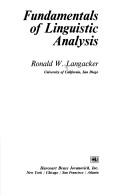
ISBN: 0155294555 0155294563 9780155294554 Year: 1972 Publisher: New York: Harcourt, Brace and Jovanovich,
Abstract | Keywords | Export | Availability | Bookmark
 Loading...
Loading...Choose an application
- Reference Manager
- EndNote
- RefWorks (Direct export to RefWorks)
Linguistics --- Linguistic analysis (Linguistics) --- Analyse linguistique (Linguistique) --- 800 --- Analysis, Linguistic (Linguistics) --- Analysis (Philosophy) --- Grammar, Comparative and general --- Taalwetenschap. Taalkunde. Linguistiek --- 800 Taalwetenschap. Taalkunde. Linguistiek --- Linguistic analysis (Linguistics).
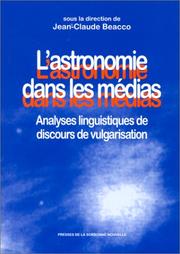
ISBN: 2878541812 2878547624 9782878541816 Year: 1999 Publisher: Paris: Presses de la Sorbonne Nouvelle,
Abstract | Keywords | Export | Availability | Bookmark
 Loading...
Loading...Choose an application
- Reference Manager
- EndNote
- RefWorks (Direct export to RefWorks)
L'astronomie n'appartient pas exclusivement au domaine de la science. La réflexion sur le mystère des origines et de l'inconnu nous concerne tous. C'est pourquoi les médias - revues de vulgarisation, journaux, cédéroms - se sont emparés de ce savoir certes rigoureux mais non encore établi. Comment les médias diffusent-ils ce savoir complexe pour le rendre accessible ? Y-a-t-il une structure discursive de la vulgarisation ? Le regard du linguiste sur la pratique du savant met en lumière la part de la spéculation et du rêve à laquelle s'attachent les médias.
Astronomy in mass media. --- Discourse analysis. --- Discourse grammar --- Text grammar --- Semantics --- Semiotics --- Mass media --- langage --- astronomie --- science --- vulgarisation --- communication --- analyse linguistique
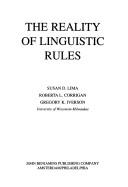
ISBN: 9027230293 1556193785 9789027230294 9781556193781 9789027282033 902728203X 6613233994 9786613233998 1283233991 Year: 1994 Volume: 26 Publisher: Amsterdam ; Philadelphia : J. Benjamins,
Abstract | Keywords | Export | Availability | Bookmark
 Loading...
Loading...Choose an application
- Reference Manager
- EndNote
- RefWorks (Direct export to RefWorks)
This volume presents a selection of the best papers from the 21st Annual University of Wisconsin-Milwaukee Linguistics Symposium. Researchers from linguistics, psychology, computer science, and philosophy, using many different methods and focusing on many different facts of language, addressed the question of the existence of linguistic rules. Are such rules best seen as convenient tools for the description of languages, or are rules actually invoked by individual language users? Perhaps the most serious challenge to date to the linguistic rule is the development of connectionist architecture.
Linguistic analysis (Linguistics). --- Analyse linguistique (Linguistique) --- Linguistic analysis (Linguistics) --- Taalanalyse (Taalwetenschap) --- Linguistics --- #KVHA:Linguistiek --- #KVHA:Taalkunde --- Analysis, Linguistic (Linguistics) --- Analysis (Philosophy) --- Grammar, Comparative and general
Multi
ISBN: 9780521190664 9780521151931 9781139026635 9781139839556 1139839551 1139841939 9781139841931 1139026631 9781139844291 1139844296 0521190665 0521151937 110723266X 1139853384 1107253195 1283835940 1139840746 Year: 2013 Publisher: Cambridge : Cambridge University Press,
Abstract | Keywords | Export | Availability | Bookmark
 Loading...
Loading...Choose an application
- Reference Manager
- EndNote
- RefWorks (Direct export to RefWorks)
"A practical step-by-step introduction to the analysis of English grammar, this book leaves the reader confident to tackle the challenges analysing grammar may pose. The first textbook to take an integrated approach to function and structure in grammatical analysis, it allows students to build experience, skills and confidence in working with grammar. The innovative, hybrid approach combines an introduction to systemic functional theory with a solid grounding in grammatical structure. The book approaches grammar in an incremental way, enabling students to develop grammatical skill in stages. It is of particular value to those starting to work with functional grammar but it is also relevant for experienced readers who are interested in developing a more systematic approach to grammatical analysis"--
English language --- Grammar --- Analyse grammaticale --- Analyse linguistique --- Anglais (langue) --- Grammaire --- Grammaire. --- Analyse grammaticale. --- Analyse linguistique. --- Grammar. --- Analysis and parsing --- Diagraming --- Composition and exercises --- Functional linguistics. --- Functional analysis (Linguistics) --- Functional grammar --- Functional linguistics --- Functional-structural analysis (Linguistics) --- Grammar, Functional --- Grammatical functions --- Linguistics --- Structural linguistics --- Arts and Humanities --- Language & Linguistics --- Germanic languages
Book
ISBN: 9783110356106 3110356104 9783110356854 9783110394429 3110356856 3110394421 9783110356861 3110356864 Year: 2014 Publisher: Berlin, [Germany] ; Boston, [Massachusetts] : Walter de Gruyter GmbH,
Abstract | Keywords | Export | Availability | Bookmark
 Loading...
Loading...Choose an application
- Reference Manager
- EndNote
- RefWorks (Direct export to RefWorks)
This volume, which has textbook character, is intended to provide an in-depth introduction to different theoretical and methodological research frameworks concerned with the role of item-specific grammatical and lexical behaviour.
Grammar --- Analyse linguistique. --- Collocation (Linguistics). --- Collocation (linguistique). --- Construction grammar. --- Grammaire de construction. --- Grammaticality (Linguistics). --- Grammaticalité. --- Linguistic analysis (Linguistics). --- Grammaire de construction --- Collocation (Linguistique) --- Grammaticalité --- Analyse linguistique (Linguistique) --- #KVHA:Taalkunde --- #KVHA:Constructiegrammatica --- #KVHA:Collocaties --- Collocation (Linguistics) --- Grammaticality (Linguistics) --- Linguistic analysis (Linguistics) --- Analysis, Linguistic (Linguistics) --- Analysis (Philosophy) --- Grammar, Comparative and general --- Grammaticalness (Linguistics) --- Acceptability (Linguistics) --- Linguistics --- Semantics --- Semantic prosody --- Collocation. --- Constructions. --- Patterns.
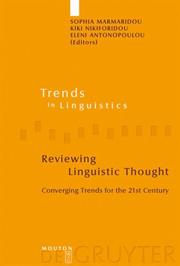
ISBN: 3110920824 3110183641 9783110920826 9783110183641 Year: 2005 Volume: 161 Publisher: Berlin ; New York : Mouton de Gruyter,
Abstract | Keywords | Export | Availability | Bookmark
 Loading...
Loading...Choose an application
- Reference Manager
- EndNote
- RefWorks (Direct export to RefWorks)
The volume focuses on the interaction of different levels of linguistic analysis (syntax, semantics, pragmatics) and the interfaces between them, on the convergence of different theoretical models in explaining linguistic phenomena, and on recent interdisciplinary approaches to linguistic analysis. Its theoretical importance lies in bringing out and highlighting some of the common trends and directions found in recent theoretical frameworks which focus on themes traditionally downplayed by mainstream 20th century linguistics. It further familiarizes the reader with the methodology used in such frameworks and shows how methodology developed in different theoretical perspectives can often converge in yielding similar results. While representing different traditions, all papers in this volume assume a necessity for the study of language to be paired with the study of cognition and for linguistics to develop more substantive links to other disciplines, thereby creating converging trends into the new century. The structure of this volume reflects this assumption along a cline of theoretical models and methodologies, starting from those that view language as part of cognition and ending with those that consider the language faculty to be distinct from general cognition. Thus the volume is divided into five parts: (I) relaxing level boundaries, (II) focusing on level interaction, (III) drawing on different theories, (IV) exploring field interaction, and (V) interdisciplinary perspectives on modularity. The volume is of particular relevance to scholars and students who are interested in an in-depth overview of 20th century linguistics outside/beyond the generative paradigm, and in exploring the development of 20th century legacy into current work.
Linguistic analysis (Linguistics) --- Linguistics --- Methodology. --- Philosophy of language --- 800 --- 800 Taalwetenschap. Taalkunde. Linguistiek --- Taalwetenschap. Taalkunde. Linguistiek --- Analyse linguistique (Linguistique) --- Linguistique --- Méthodologie --- Analysis, Linguistic (Linguistics) --- Analysis (Philosophy) --- Grammar, Comparative and general --- Methodology --- Cognitive linguistics. --- Linguistic analysis.
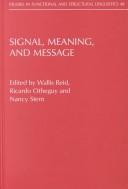
ISBN: 902721557X 1588112896 9781588112897 9789027215574 9789027282231 9027282234 1283234114 9781283234115 9786613234117 6613234117 Year: 2002 Volume: 48 Publisher: Amsterdam ; Philadelphia : John Benjamins Pub. Co.,
Abstract | Keywords | Export | Availability | Bookmark
 Loading...
Loading...Choose an application
- Reference Manager
- EndNote
- RefWorks (Direct export to RefWorks)
This is the second volume of papers on sign-based linguistics to emerge from Columbia School linguistics conferences. One set of articles offers semantic analyses of grammatical features of specific languages: English full-verb inversion; Serbo-Croatian deictic pronouns; English auxiliary do; Italian pronouns egli and lui; the Celtic-influenced use of on (e.g., 'he played a trick on me'); a monosemic analysis of the English verb break. A second set deals with general theoretical issues: a solution to the problem that noun class markers (e.g. Swahili) pose for sign-based linguistics; the appropriateness of statistical tests of significance in text-based analysis; the word or the morpheme as the locus of paradigmatic inflectional change; the radical consequences of Saussure's anti-nomenclaturism for syntactic analysis; the future of 'minimalist linguistics' in a maximalist world. A third set explains phonotactic patterning in terms of ease of articulation: aspirated and unaspirated stop consonants in Urdu; initial consonant clusters in more than two dozen languages. An introduction highlights the theoretical and analytical points of each article and their relation to the Columbia School framework. The collection is relevant to cognitive semanticists and functionalists as well as those working in the sign-based Jakobsonian and Guillaumist frameworks.
Analyse linguistique (Linguistique) --- Explanation (Linguistics) --- Explication (Linguistique) --- Linguistic analysis (Linguistics) --- Semeiotics --- Semiology (Linguistics) --- Semiotics --- Semiotiek --- Sémiologie --- Sémiotique --- Séméiologie --- Séméiotique --- Taalanalyse (Taalwetenschap) --- Verklaring (Taalwetenschap) --- Lexicology. Semantics --- Psycholinguistics --- Phonetics --- Explanatory (Linguistics) --- Explanatory adequacy (Linguistics)
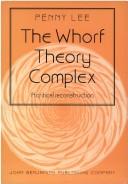
ISBN: 902724569X 1556196180 9786613174772 1283174774 9027283907 1556196199 9789027283900 9781556196188 9781556196195 9789027245694 9027245703 9789027245700 Year: 1996 Volume: 81 Publisher: Amsterdam ; Philadelphia : J. Benjamins Pub.,
Abstract | Keywords | Export | Availability | Bookmark
 Loading...
Loading...Choose an application
- Reference Manager
- EndNote
- RefWorks (Direct export to RefWorks)
At last - a comprehensive account of the ideas of Benjamin Lee Whorf which not only explains the nature and logic of the linguistic relativity principle but also situates it within a larger 'theory complex' delineated in fascinating detail. Whorf's almost unknown unpublished writings (as well as his published papers) are drawn on to show how twelve elements of theory interweave in a sophisticated account of relations between language, mind, and experience. The role of language in cognition is revealed as a central concern, some of his insights having interesting affinity with modern connection
Psycholinguistics --- Philosophy of language --- Sociolinguistics --- Whorf, B. --- Whorf, Benjamin Lee --- Sapir-Whorf hypothesis. --- Linguistic analysis (Linguistics) --- Analysis, Linguistic (Linguistics) --- Analysis (Philosophy) --- Grammar, Comparative and general --- Relativity (Linguistics) --- Whorf-Sapir hypothesis --- Anthropological linguistics --- Whorf, Benjamin Lee, --- Whorf, B. L. --- וורף, בנג׳מין לי, --- Sapir-Whorf hypothesis --- Analyse linguistique (Linguistique) --- Sapir-Whorf, Hypothèse de
| Listing 1 - 10 of 27 | << page >> |
Sort by
|

 Search
Search Feedback
Feedback About UniCat
About UniCat  Help
Help News
News